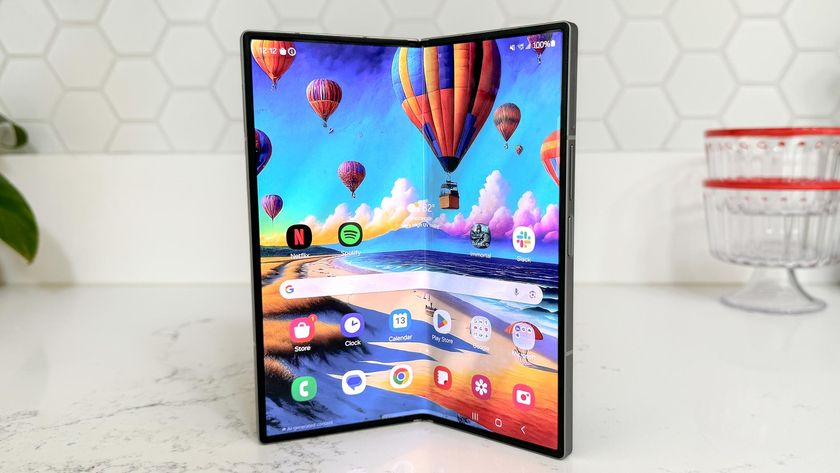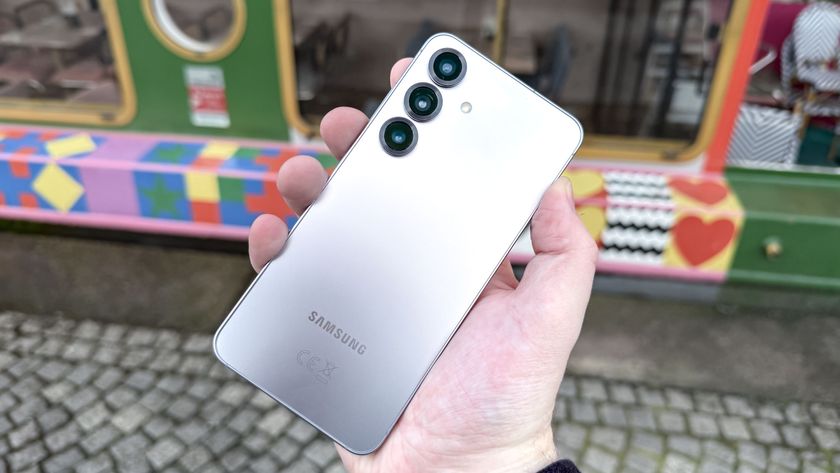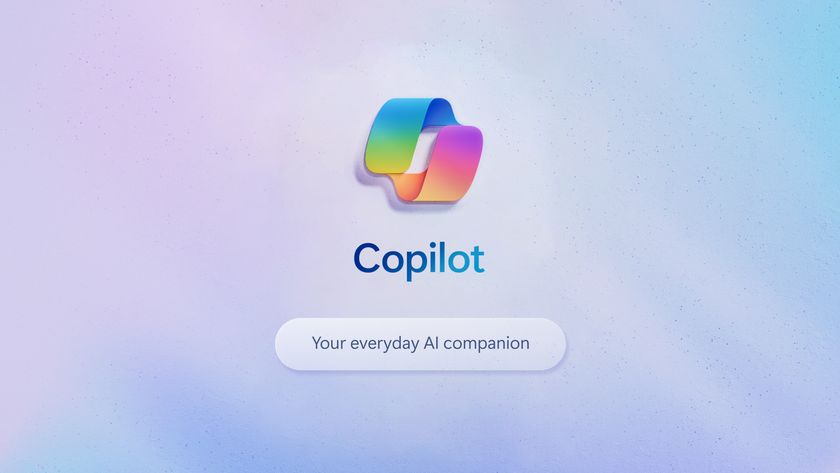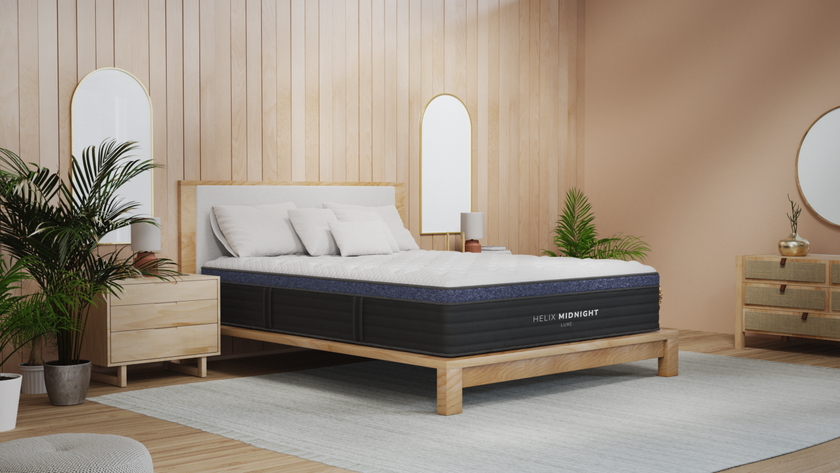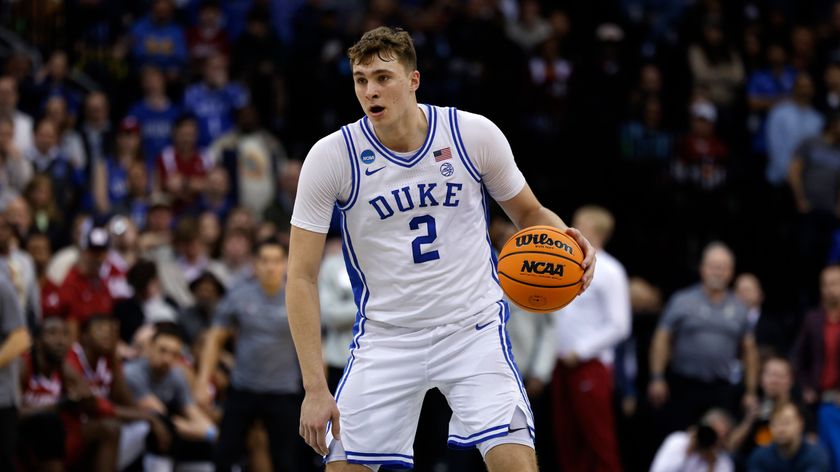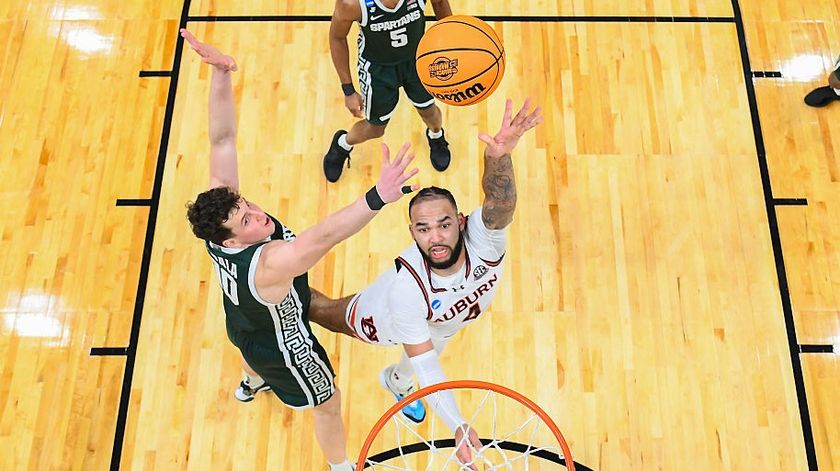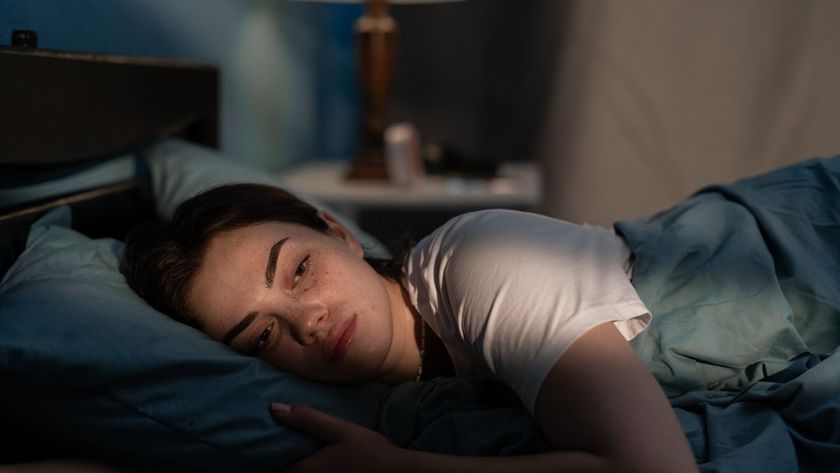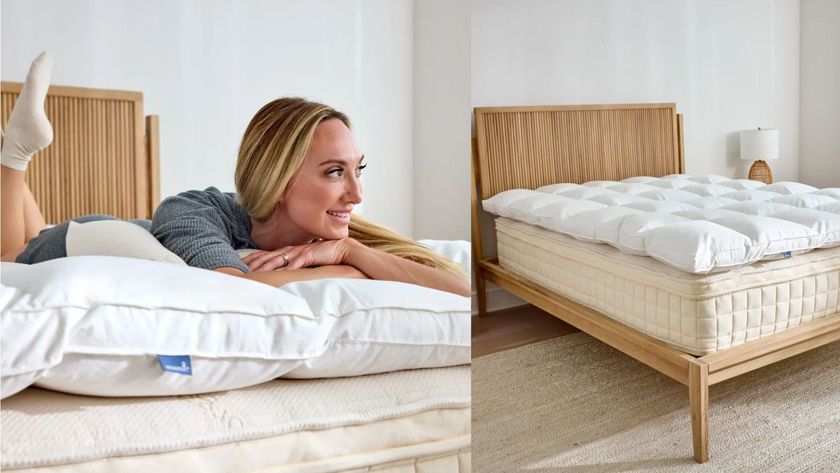Samsung Galaxy Z Fold 3 vs Galaxy Z Flip 3: What's the difference?
Here's how the Galaxy Z Fold 3 and Galaxy Z Flip 3 compare
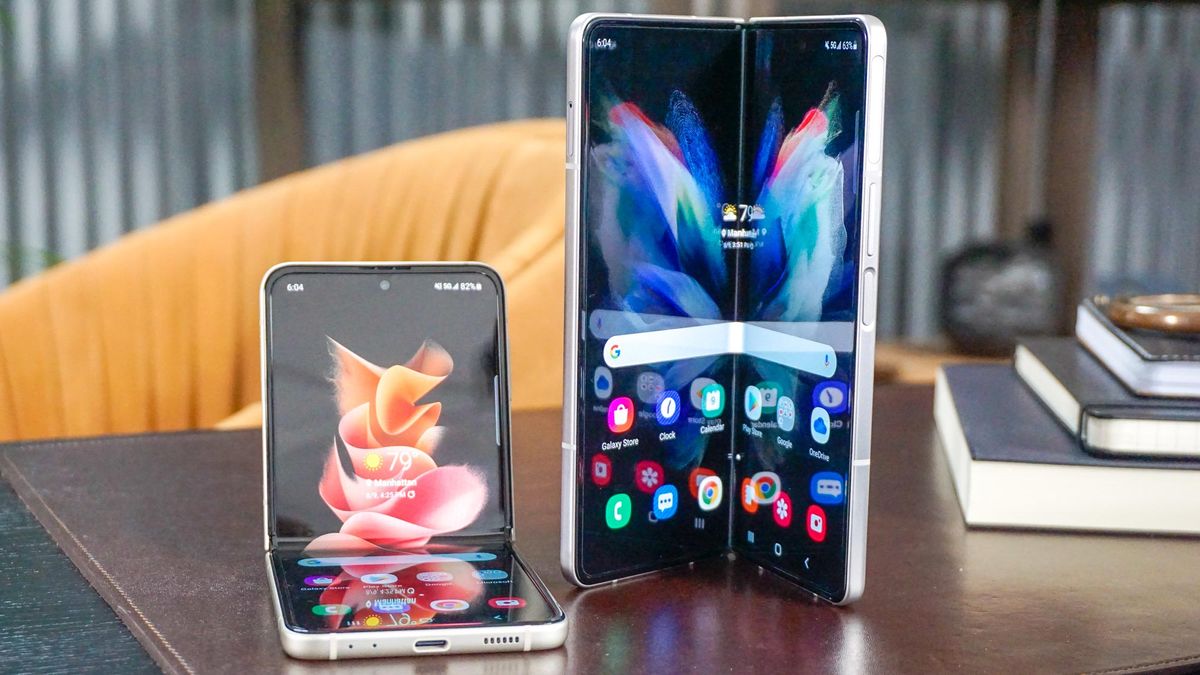
Editor's note: The Galaxy Z Fold 4 and Galaxy Z Flip 4 are the new kids on the block, improving upon their predecessors in every conceivable way. We no longer recommend you purchase either the Galaxy Z Fold 3 or Galaxy Z Flip 3.
The Samsung Galaxy Z Fold 3 vs. Galaxy Z Flip 3 face-off takes last year's foldables and pits them against each other. They take the basic concept of foldable in two different directions, and as a result you can find some big differences in their displays, cameras, battery life and especially price,
Here's the gist. As you'll see in our Galaxy Z Fold 3 review, this $1,799 device is a phone and tablet in one, transforming from a 6.2-inch handset to a 7.6-inch slate, making it ideal for work and play. Versus the Galaxy Z Fold 2, the Z Fold 3 is still especially good for running multiple apps at once, but it now offers S Pen support so you can write directly on the display.
Our Galaxy Z Flip 3 review reveals a more affordable and accessible option, starting at $999. It features a 1.9-inch cover display for checking info on the fly or taking selfies and a 6.7-inch main display. Its main appeal is folding up into a compact design for easily slipping into a pocket, and the fact that you can use its laptop-like Flex mode for video calls and other apps. Just beware of short battery life.
Our Samsung Galaxy Z Fold 3 vs. Galaxy Z Flip 3 comparison runs down all the changes to Samsung's newest foldable phones to help you figure out which one is the best fit for you.
Samsung Galaxy Z Fold 3 vs Galaxy Z Flip 3: Specs
| Row 0 - Cell 0 | Row 0 - Cell 1 | Row 0 - Cell 2 |
| Price | From $1,799 | From $999 |
| CPU | Snapragon 888 | Snapragon 888 |
| RAM | 12GB | 8GB |
| Storage | 256, 512GB | 128, 256GB |
| External display | 6.2 inches (2268 x 832) 120Hz Adaptive | 1.9 inches (260 x 512) |
| Internal display | 7.6 inches (2208 x 1768) 120Hz Adaptive | 6.7 inches (2640 x 1080) 120Hz adaptive |
| Rear cameras | 12MP wide (f/1.8); 12MP ultra-side (f.2.2, 123-degree FOV); 12MP telephoto (f/2.4, 2x optical zoom, 10x digital zoom) | 12MP wide-angle (f/2.4); 12MP ultra-wide (f/2.2) 123-degree FOV |
| Front camera | 10MP (f/2.2) | 10MP (f/2.4) |
| Under-display camera | Under-display camera: 4MP (f/1.8) | N/A |
| Battery | 4,400 mAh | 3,300 mAh |
| Battery life | 7 hours 52 minutes | 5 hours 43 minutes |
| Charging | 25W (charger not included) | 15W (not included) |
| Size | 6.2 x 2.6 x 0.56 to 0.62 inches (closed); 6.2 x 5 x 0.25 inches (open) | 3.4 x 2.8 x 0.63-0.67 inches (closed); 6.5 x 2.8 x 0.27 inches (open) |
| Weight | 9.55 ounces | 6.5 ounces |
Samsung Galaxy Z Fold 3 vs. Galaxy Z Flip 3: Price and availability
The Samsung Galaxy Z Fold 3 is fairly pricey at $1,799 for the 256GB model, and that goes up to $1,899 for the 512GB version.
Meanwhile, the Galaxy Z Flip is the most affordable foldable phone yet with a price of $999 for 128GB of storage. The 256GB version costs $1,099.
Sign up to get the BEST of Tom's Guide direct to your inbox.
Get instant access to breaking news, the hottest reviews, great deals and helpful tips.
Samsung has updated its pages to reflect the fourth generation of foldables for sale.
Samsung Galaxy Z Fold 3 vs. Galaxy Z Flip 3: Design and displays

If you're looking for something compact the Galaxy Z Flip 3 is for you. It has a 1.9-inch cover display (4 times bigger than the original Z Flip) and a 6.7-inch 120Hz main screen. It folds up to just 3.4 x 2.8 x 0.63-0.67 inches when closed and it weighs just 6.5 ounces. You'll barely feel this foldable phone in your pocket.
The Galaxy Z Fold 3 is a beast of a phone because it can double as a tablet, and its main display stretches a whopping 7.6 inches. Another plus: there's a new under-display camera that disappears when not in use, so you don't have to look at a punch hole, The exterior screen remains 6.2 inches, but the good news is that both panels now have 120Hz refresh rates.

The Galaxy Z Flip 3 comes in a wider array of color options. You can take your pick from Cream, Green, Lavender, and Phantom Black. The Galaxy Z Fold 3 is more conservative with its three colors: Phantom Black, Phantom Green and Phantom Silver.
Samsung upped the durability on both phones, thanks to a stronger Armor Aluminum casing, a display that's up to 80% more durable and IPX8 water resistance that should survive splashes and rain.
Samsung Galaxy Z Fold 3 vs. Galaxy Z Flip 3: Cameras
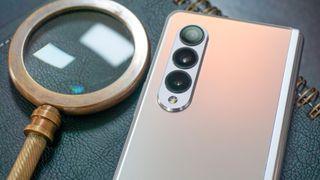
There are very big differences between the Galaxy Z Fold 3 and Z Flip 3 cameras. The Z Fold 3 features a triple rear camera setup that includes 12MP wide, ultra-wide and telephoto lenses. Optical zoom is 2x and digital zoom is 10x.
In addition, the Z Fold 3 features 10MP selfie camera up front, plus a 4MP under-display camera at the top right corner of the 7.6-inch display. The latter is best used for video calls as it's not super sharp.
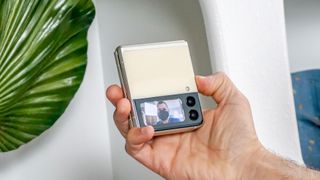
The Galaxy Z Flip 3 packs dual 12MP cameras: a wide-angle lens and 12MP ultra-wide lens with a 123-degree field of view. Up front is a 10MP selfie camera. Unfortunately, you don't get a telephoto zoom with the Flip.
Samsung Galaxy Z Fold 3 vs. Galaxy Z Flip 3: Performance
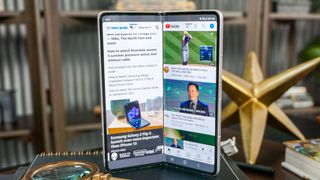
The Galaxy Z Fold 3 and Z Flip 3 are powered by the same Snapdragon 888 processor, so you should expect similar performance. However, the Z Fold 3 has more RAM with 12GB, while the Z Flip 3 has less with 8GB. So the Z Fold 3 might be a bit better running multiple apps at once.
In the Geekbench 5 benchmark, for example, the Galaxy Z Flip 3 scored 2,984 in the multicore portion of the test, compared to 3,418 for the Galaxy Z Fold 3.
The Z Fold 3 also has a storage advantage, as it comes with 256GB standard. You can also spring for a 512GB model. The Z Flip 3 makes due with 128GB with a 256GB option.
Samsung Galaxy Z Fold 3 vs. Galaxy Z Flip 3: Battery life and charging
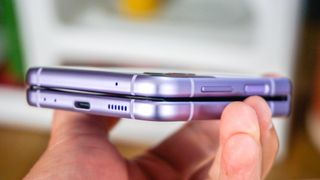
There are really big differences here between the Galaxy Z Fold 3 and Z Flip 3, both in terms of battery life and charging. The Galaxy Z Fold 3 packs a 4,400 mAh dual battery, so it should be able to last you all day. The Galaxy Z Flip 3 has a considerably smaller 3,300 mAh battery.
On the Tom's Guide battery test, the Z Fold 3 lasted 7 hours and 52 minutes, which is okay but shorter than the handsets on our best phone battery life list. The Galaxy Z Flip 3 lasted a much shorter 5:43.
The Galaxy Z Fold 3 has an advantage in fast charging as well, with the ability to support 25W charging. Meanwhile, the Z Flip 3 maxes out at just 15W. Just keep in mind that neither phone comes with a charger, so you'll have to buy one if you don't have a USB-C charger handy.
In our testing, the Galaxy Z Flip 3 got to 44% in 30 minutes, while the Galaxy Z Fold 3 got to 47% in the same amount of time.
Samsung Galaxy Z Fold 3 vs. Galaxy Z Flip 3: Software and special features
If you like to multitask, the Galaxy Z Fold 3 is the better choice for you. The Z Fold 3 lets you run up to three apps on the screen at once, and it's also working with third-party developers to optimize their apps for the Fold 3's large display. Microsoft Office, Snapchat, Netflix, Spotify, YouTube and TikTok are just some of the apps getting better.
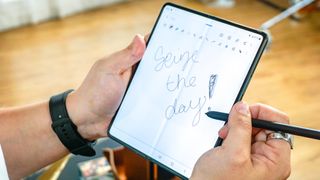
The Z Fold 3 is also the first foldable phone to work with the S Pen, so you can take notes on screen, draw and more. You can choose from the Galaxy Z Fold S Pen edition ($49) for get the beefier Bluetooth-enabled S Pen Pro ($99). You can also get a case with the S Pen included for $79.
The Galaxy Z Flip 3 has some special features of its own, starting with its 1.9-inch cover display. This touchscreen lets you interact with several widgets, including weather, notifications and music playback. Plus, you can take photos and videos using the cover display with just a press of the power button, which comes in handy for selfies.

Another Galaxy Z Flip 3 perk is Flex mode. A number of apps take advantage of the foldable display so that they display content on top and controls on the bottom, such as the Camera app and YouTube. And more are on the way. We also like that you can use Flex mode to make hands-free video calls, enabling you to perch the Z Fold 3 almost anywhere like a mini tripod.
However, note that the Galaxy Z Fold 3 also supports Flex mode, making it the more versatile phone overall.
Samsung Galaxy Z Fold 3 vs. Galaxy Z Flip 3: Bottom line
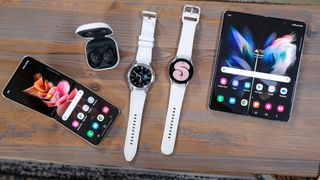
Overall, the Galaxy Z Fold 3 and Galaxy Z Flip 3 are for very different target audiences. The Z Fold 3 is for power users who like the idea of having a phone and tablet in one device and are willing to pay a premium for that versatility. And Samsung now rewards your sticker shock with S Pen support, a more durable design and improved multitasking features and apps.
However, we wish the Z Fold 3 had an S Pen built in. For that, we may need to wait for the rumored Galaxy Z Fold 4. A thinner design would be nice, too.
The Galaxy Z Flip 3 is all about style and having fun, and it's $999 price is very tempting for those who have been sitting out the foldable phone revolution. You have to make some trade-offs versus other flagship phones in terms of the cameras and battery life, but it could be worth it for you.
Mark Spoonauer is the global editor in chief of Tom's Guide and has covered technology for over 20 years. In addition to overseeing the direction of Tom's Guide, Mark specializes in covering all things mobile, having reviewed dozens of smartphones and other gadgets. He has spoken at key industry events and appears regularly on TV to discuss the latest trends, including Cheddar, Fox Business and other outlets. Mark was previously editor in chief of Laptop Mag, and his work has appeared in Wired, Popular Science and Inc. Follow him on Twitter at @mspoonauer.

